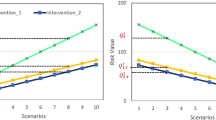Abstract
The paper focuses on evaluating constraint satisfaction search algorithms on application based random problem instances. The application we use is a well-studied problem in the electric power industry: optimally scheduling preventive maintenance of power generating units within a power plant. We show how these scheduling problems can be cast as constraint satisfaction problems and used to define the structure of randomly generated non-binary CSPs. The random problem instances are then used to evaluate several previously studied algorithms. The paper also demonstrates how constraint satisfaction can be used for optimization tasks. To find an optimal maintenance schedule, a series of CSPs are solved with successively tighter cost-bound constraints. We introduce and experiment with an “iterative learning” algorithm which records additional constraints uncovered during search. The constraints recorded during the solution of one instance with a certain cost-bound are used again on subsequent instances having tighter cost-bounds. Our results show that on a class of randomly generated maintenance scheduling problems, iterative learning reduces the time required to find a good schedule.
Similar content being viewed by others
Explore related subjects
Discover the latest articles, news and stories from top researchers in related subjects.References
T.M. Al-Khamis, S. Vemuri, L. Lemonidis and J. Yellen, Unit maintenance scheduling with fuel constraints, IEEE Trans. on Power Systems 7(2) (1992) 933-939.
R. Bayardo and D. Mirankar, A complexity analysis of space-bounded learning algorithms for the constraint satisfaction problem, in: Proceedings of the 13th National Conference on Artificial Intelligence (1996) pp. 298-304.
J.R. Bitner and E.M. Reingold, Backtrack programming techniques, Comm. of the ACM 18(11) (1975) 651-656.
R. Dechter, Enhancement schemes for constraint processing: Backjumping, learning, and cutset decomposition, Artif. Intell. 41 (1990) 273-312.
R. Dechter, Constraint networks, in: Encyclopedia of Artificial Intelligence (Wiley, New York, 2nd edition, 1992) pp. 276-285.
J.F. Dopazo and H.M. Merrill, Optimal generator maintenance scheduling using integer programming, IEEE Trans. on Power Apparatus and Systems 94(5) (1975) 1537-1545.
G.T. Egan, An experimental method of determination of optimal maintenance schedules in power systems using the branch-and-bound technique, IEEE Trans. SMC 6(8) (1976).
D. Frost, Algorithms and heuristics for constraint satisfaction problems, Ph.D. thesis, University of California, Irvine, CA (1997).
D. Frost and R. Dechter, Dead-end driven learning, in: Proceedings of the 12th National Conference on Artificial Intelligence (1994) pp. 294-300.
D. Frost and R. Dechter, In search of the best constraint satisfaction search, in: Proceedings of the 12th National Conference on Artificial Intelligence (1994) pp. 301-306.
D. Frost and R. Dechter, Look-ahead value ordering for constraint satisfaction problems, in: Proceedings of the 14th International Joint Conference on Artificial Intelligence (1995) pp. 572-578.
R.M. Haralick and G.L. Elliott, Increasing tree search efficiency for constraint satisfaction problems, Artif. Intell. 14 (1980) 263-313.
H. Kin, Y. Hayashi and K. Nara, An algorithm for thermal unit maintenance scheduling through combined use of GA, SA and TS, IEEE Trans. on Power Systems 12(1) (1996) 329-335.
A.K. Mackworth and E.G. Freuder, The complexity of some polynomial network consistency algorithms for constraint satisfaction problems, Artif. Intell. 25 (1985) 65-74.
P. Prosser, Hybrid algorithms for the constraint satisfaction problem, Comput. Intell. 9(3) (1993) 268-299.
J. Yellen, T.M. Al-Khamis, S. Vemuri and L. Lemonidis, A decomposition approach to unit maintenance scheduling, IEEE Trans, on Power Systems 7(2) (1992) 726-731.
H.H. Zurm and V.H. Quintana, Generator maintenance scheduling via successive approximation dynamic programming, IEEE Trans, on Power Apparatus and Systems 94(2) (1975).
Author information
Authors and Affiliations
Rights and permissions
About this article
Cite this article
Frost, D., Dechter, R. Maintenance scheduling problems as benchmarks for constraint algorithms. Annals of Mathematics and Artificial Intelligence 26, 149–170 (1999). https://doi.org/10.1023/A:1018906911996
Issue Date:
DOI: https://doi.org/10.1023/A:1018906911996




